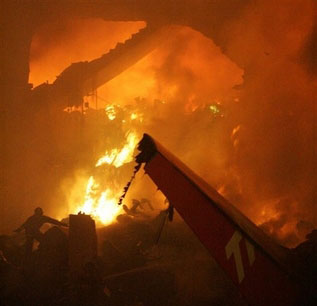Brazilian plane with 170 aboard crashes
(AP)Updated: 2007-07-18 08:02
 A rescuer is seen next to flames at the site where a TAM airlines commercial jet crashed in Sao Paulo, Tuesday, July 17, 2007. [AP]  |
There were no immediate reports of deaths by authorities, but a witness said he saw one charred body as flames shot into the sky and clouds of black smoke billowed into the air after the crash.
The Tam airline's Airbus-320 skidded off the runway at Congonhas airport, then crossed a busy road at the height of rush hour in South America's largest city before slamming into a gas station, said Jose Leonardi Mota, a spokesman with airport authority Infraero.
Tam worker Elias Rodrigues Jesus, walking near the site just as the crash happened, told The Associated Press that the jet exploded in between the gas station and a warehouse owned by Tam.
"All of a sudden I heard a loud explosion, and the ground beneath my feet shook," Jesus said. "I looked up and I saw a huge ball of fire, and then I smelled the stench of kerosene and sulfur."
Jesus said he saw one charred body, and Globo TV reported that at least eight people were being treated for injuries. It was not clear whether they were passengers or had been in the building.
Tam Linhas Aereas flight 3054 was en route to Sao Paulo from the southern Brazilian city of Porto Alegre with between 150 and 170 people on board, Mota said. The government-run Agencia Brasil news agency said there were 170 passengers and eight crew members on the jet.
"At this moment, we cannot determine the extent of possible injuries suffered by the airplanes occupants and crew members," the airline said in a statement.
The accident happened during heavy rains, and critics have warned for years that such an accident was possible at the airport because its runway is too short for large planes landing when the runway is wet.
A federal court in February briefly banned takeoffs and landings of large jets at the airport because of safety concerns at the airport, which handles huge volumes of flights for the massive domestic Brazilian air travel market.
But an appeals court overruled the ban on three types of planes, saying it was too harsh because it would have severe economic ramifications and that there were not enough safety concerns to prevent the planes from landing and taking off the airport.
Tuesday's crash came 10 months after Brazil's deadliest crash, a September collision between a Gol Aerolinhas Inteligentes SA Boeing 737 and an executive jet over the Amazon rainforest.
All 154 people on the Gol jet died. The executive jet landed safely.
The crash highlighted Brazil's increasing aviation woes, as a surge in travelers overwhelms underfunded air traffic control systems. A Brazilian judge indicted four flight controllers and the smaller jet's two U.S. pilots on the equivalent of manslaughter charges, but the defendants point to other problems ¡ª from holes in radar coverage to the inability of some Brazilian controllers to clearly speak English, the language of international aviation.
Controllers -- concerned about being made scapegoats -- have engaged in strikes and work slowdowns to raise safety concerns, causing or exacerbating lengthy delays and cancelations.
Angry travelers have stormed airline check-in counters and runways in Brazil, and fistfights have broken out in waiting areas.
|
|
|
||
|
||
|
|